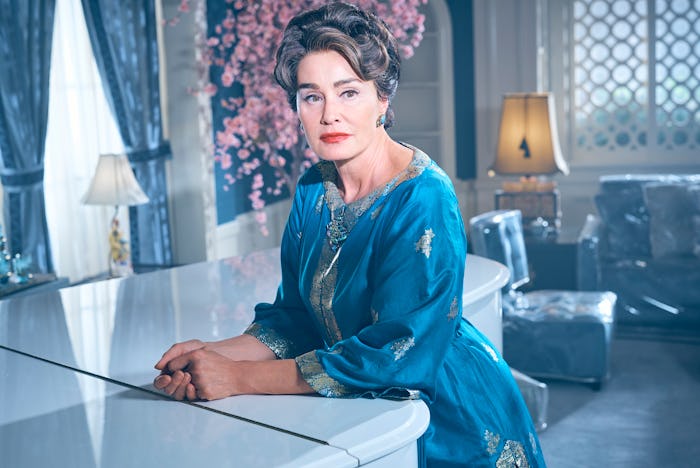Entertainment

Joan Crawford Opens Up About Her Childhood On 'Feud'
In Episode 3 of Feud, Joan Crawford and Bette Davis sat down for a dinner where they dished out stories of their children and their own upbringing in a rare moment of camaraderie. However, while Bette's childhood had been a mostly happy one, the childhood Joan described was nothing short of horrifying. She was abused physically and neglected emotionally by her mother, forced into hard labor as a young girl, and sexually abused by her stepfather, Henry Cassin. Joan Crawford's childhood story on Feud was disturbing, but important when it comes to contextualizing and understanding Joan's life.
In addition to raising important issues, the story drew attention to the way Joan had rationalized what happened to her, sharing the events of her childhood in an almost offhand way that belied her trauma. Born Lucille LeSueur in San Antonio in 1908, Crawford grew up in poverty. Her biological father ran off not long after she was born, which was when her mother married Henry Cassin. Called Billie because she was a tomboy, Crawford also adopted Cassin's last name; according to her, he was the only father she had ever known. That he was her rare source of comfort in a violent childhood was possibly one of the reasons she downplayed his sexual abuse of her: it was a way for her to cope with what happened, and reconcile the fact that someone she cared for could do that to her.
On Feud, Joan said that her sexual relationship with Cassin began when she was only 11 years old. Though Bette's horror was evident, Joan insisted that the relationship was one where she could find the love and affection she was denied by her cruel mother, who didn't care if Joan lived or died. Joan Crawford: The Essential Biography by Lawrence J. Quirk and William Schoell contained the same quote Joan used on Feud when discussing what happened: "It wasn't incest. We weren't even related. He was gentle and kind and I led him into it."
Though it may not have been technically incest, Crawford didn't even know Cassin wasn't her real father at first. "I couldn't imagine anyone else being my daddy," Crawford said in Not the Girl Next Door, a biography by Charlotte Chandler. "For a long time, I didn't know I had another father." Crawford defended Cassin over the years and before the abuse was public knowledge, he was often painted as a positive force in her life, the one who helped introduce her to show business through the theatres he owned. Cassin was Crawford's father in every way that counted and he took advantage of the power he had over her; obviously, an 11-year-old child cannot "lead" a grown man into sex.
Crawford's youth was full of so much pain and punishment that it was understandable that she would latch onto the one relationship where she was getting any kind of attention, no matter what that attention was. To survive it, she had to pretend it was something else. "Coming up out of that terrible poverty and that kind of childhood, with no education, she learned to use sexuality as either a solace or a reward or a tool," Jessica Lange explained in an interview with Vanity Fair.
What happened to Joan when she was a child had a lasting effect on the rest of her life. Exploring her past on Feud was important not only because it gave viewers a fuller understanding of Crawford as a person, but because her story needed to be heard. Her trauma — and her way of dealing with it — was complicated and even uncomfortable, but that was her story.